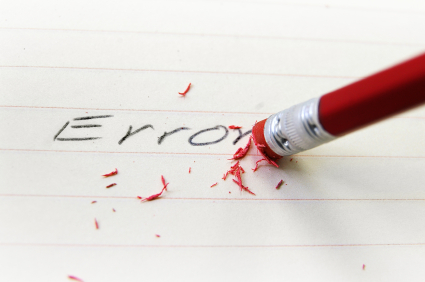Make Mistakes with Class
We human beings are fallible. We make mistakes. Screw up. Goof. Err. Given that errors are inevitable, I’m always surprised by how painful it can be when that aspect of our humanity manifests itself.
A healthy respect for our fallibility is a very good thing. It causes us to be careful, and to design processes and objects that respect our human shortcomings. Fail-safe systems exist simply because, well, systems fail. So, with that in mind, we proceed with caution. We may learn to work together, in ways that shore up our shortcomings. We get better, and we minimize the inevitable errors along the way.
Sometimes that respect turns to fear, and that’s not always such a good thing. Fear of making mistakes can paralyze us. It can lead us to avoid acceptable risks, foregoing desirable outcomes. In other words, we don’t go for it, so we don’t succeed. Even if we are able to muster our courage, the fear can make us tense, less focused, again less likely to succeed in the long run. Most troubling, perhaps, is the desire to hide or cover up our mistakes. There’s almost no mistake that can’t be made worse by covering it up afterwards. Fear of making mistakes, beyond a healthy respect, can only make us less effective.
So, I propose that we embrace our fallibility, and learn to make mistakes with class. This means:
- Be accountable for our mistakes. Own our errors, and make a sincere effort to mitigate any harm we’ve caused.
- Learn from our mistakes. Don’t repeat them.
- Forgive ourselves and move on with our lives.
Making mistakes with class not only helps us recover from our missteps; it helps us avoid the fear that can actually bring on more errors, or worse ones.
Here’s another benefit: if we make mistakes with class, we set the tone that allows others to do so, as well. Too often, our workplaces feature cultures in which people are overcautious, even paralyzed, or where fear of embarrassment increases the temptation to cover up mistakes. Nobody benefits from that. Let us lead by example, showing that even duly cautious people make mistakes, and respond to them like effective adults. By owning our mistakes, learning from them, and then forgiving ourselves and moving on, we can actually reduce errors and increase our ability to respond to the remaining issues at the same time.
Note: this blog post first appeared on Leadership and Community, www.leadershipandcommunity.com. Check out that site for contributions from a talented team of writers, and from me. CAW




Leave a Reply
Want to join the discussion?Feel free to contribute!